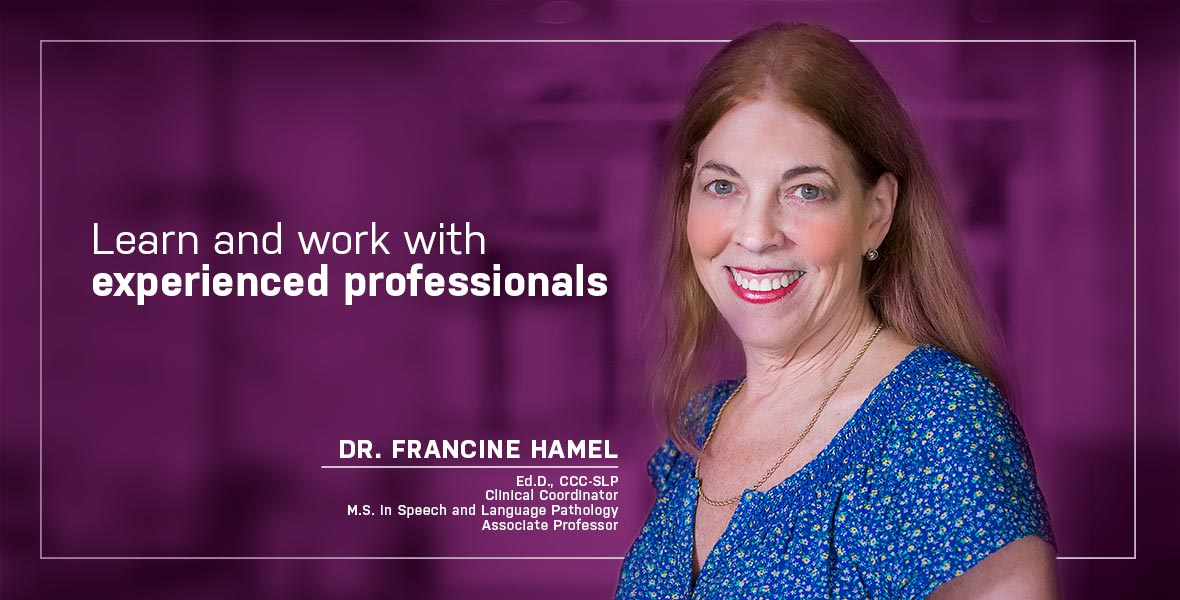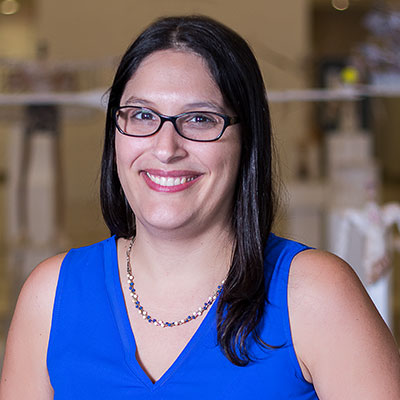The M.S. in Speech and Language Pathology program at Albizu University trains you to become a competent speech-language pathologist who is prepared to provide clinical services to children and adults with speech and language disorders as well to serve as a consultant or clinical supervisor. To be a professional in the communication disorders field requires knowledge and skills that transcend cultural and linguistic barriers. Albizu University, with its historic focus on sensitivity to cultural and ethnic issues, enables you to become a well-informed and clinically competent specialist who can effectively work with children and adults from diverse backgrounds.
BECOME A SPEECH-LANGUAGE PATHOLOGIST
PROGRAM OVERVIEW
Communication is the primary way humans connect with each other. Speech-language pathologists improve the quality of life of children and adults with speech, language, and other related disorders from infancy through the elder years. The M.S. in Speech and Language Pathology (MSLP) program at Albizu University trains you to provide clinical services to people of all ages as well to serve as a consultant or clinical supervisor.
To be a professional in the communication disorders field requires knowledge and skills that transcend cultural and linguistic barriers. Albizu University, with its historic focus on sensitivity to cultural and ethnic issues, enables you to become a well-informed and clinically competent specialist who can effectively work with children and adults from diverse backgrounds.





ACCREDITATION
The Master of Science in Speech and Language Pathology education program at Albizu University is accredited by the Council on Academic Accreditation in Audiology and Speech-Language Pathology (CAA) of the American Speech-Language-Hearing Association, 2200 Research Boulevard #310, Rockville, Maryland 20850, 800-498-2071 or 301-296-5700.
PROGRAM HIGHLIGHTS
The MSLP program trains you in intervention and therapeutic techniques and in the tools used to assess communication disorders. Academic learning is integrated with practicum experiences at a variety of clinical sites to help you acquire the skills needed to work with populations affected by developmental delay, autism, reading and writing impairments, aphasia, dementia, voice and fluency disorders, hearing impairments, craniofacial abnormalities, neurogenic speech disorders, and articulatory and phonological disorders, among others.
The program integrates sensitivity to diversity into all its courses and clinical experiences. Our faculty members are active practitioners with extensive experience as clinical supervisors in diverse settings. Students work in small groups, enabling hands-on experience and direct interaction with peers and faculty.
CAREER OPPORTUNITIES
Graduates of the M.S. in Speech and Language Pathology program find employment in an array of settings, including schools, preschool centers, private practice, hospitals, skilled nursing facilities, and community-based programs.
According to the U.S. Department of Labor Bureau of Labor Statistics, employment for speech-language pathologists is expected to grow 21% from 2014 to 2024, much faster than the average for all occupations.
ADMISSION REQUIREMENTS
For the master’s program in speech and language pathology consists of the following:
- A completed and signed application form submitted prior to the established deadline and accompanied by the $50 application fee. Begin the application process by setting up an online account.
- Official transcripts from all previous undergraduate and graduate (if applicable) institutions attended, showing that the following conditions have been met:
-
- A bachelor’s degree from an accredited institution of higher education in the United States is required. Applicants enrolled in an institution of higher education outside the United States whose standards of training are substantially equivalent to the standards of training of those institutions in the United States will also be considered.
- Preference is given to applicants with a cumulative grade point average (GPA) of 3.0 or higher.
- Completed applications will be reviewed on a case-by-case basis if the academic credentials of the applicant do not meet the minimum requirement.
- The transcripts must include any degree received.
- Three letters of recommendation, preferably from past professors, either on letterhead or using the official Albizu recommendation form.
- GRE (Graduate Record Examination) or EXADEP (Graduate Studies Admission Examination) scores from exams taken within the last 5 years.
- Prerequisite course work completed prior to admission in the following topics: Introduction to Exceptional Child Education, Biological Science (Neuroanatomy or Neurophysiology), Statistics in Psychology, Developmental Psychology, Professional Writing, Acoustics, and Chemistry or Physics.
- A current curriculum vitae summarizing the applicant’s credentials.
- Proof of appropriate immigration status for all international students. International students should also submit an official evaluation of academic credentials by an authorized agency. The credentials must include the GPA. For detailed information on this requirement, please refer to the Credential Evaluation Services page of the Albizu website. All admission credentials for
international students must be received by Albizu University at least 90 days prior to the beginning of the session of expected enrollment.
Founded in 1966, Albizu University is the first professional school of psychology established in North America and the Caribbean, with an ongoing focus on serving culturally diverse populations.

Expert Faculty
Our courses are taught by professors who are both academics and active professionals. Faculty members bring to the classroom a working expertise in theories, research, and practice in their fields.

A Strong Heritage
Founded in 1966 Albizu University is the first professional school of psychology established in North America and the Caribbean.

Flexibility
Albizu University offers morning, afternoon, evening, and night classes to provide you with the flexibility and convenience you need to meet all of life’s demands. Online classes and programs are also available.
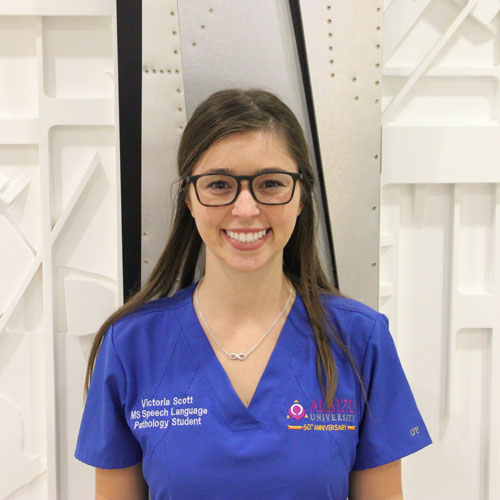
I chose Albizu University because I heard great things about the program and wanted to further my education with a Masters Degree. This has been the best experience and I am so thankful for having the opportunity to be in their program.
-Victoria Scott – Speech Pathology Masters Program
LEARN WITH THE BEST
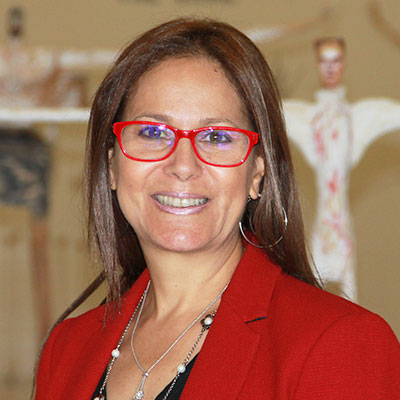
Dr. Lizzette Alcaraz
Institutional Speech and
Language Pathology
Program Director
Associate Professor
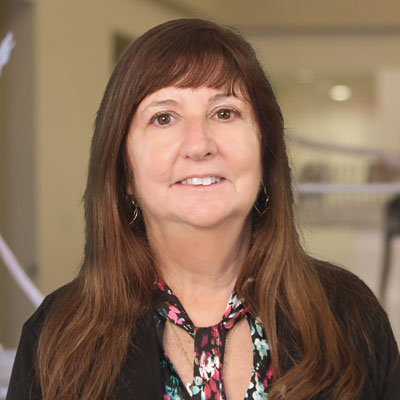
Dr. Sheri Feldman
Ed.D., CCC-SLP
Program Coordinator, M.S. in Speech
and Language Pathology
Assistant Professor

Dr. Francine Hamel
Ed.D., CCC-SLP
Clinical Coordinator,
M.S. in Speech and Language Pathology
Associate Professor
COURSES

Study of the anatomy and physiology of the speech and hearing mechanism including respiratory, phonatory, articulatory, nervous, and hearing systems.
Overview of the audiology profession, its historical background, physical properties of
the sound, ear anatomy, physiology of the auditory system, common disorders and
administration and interpretation of hearing tests
Study of the normal speech and language acquisition process. Distinctions between speech and language are established. Terminology and speech and language characteristics according to developmental stages are explained. The course includes the analysis of sound acquisition and most common speech and language disorders.
This course discusses the ethical and legal principles applied to the Speech/Language Pathology Profession. American Speech-Language-Hearing Association (ASHA) Code of Ethics is studied. Study of the responsibilities and professional omissions of legal or ethics nature are revised.
Overview of the normal and atypical language development in children. Study of the factors that might affect communicative development. Methods of evaluation and intervention related to each disorder are studied.
Study of the characteristics of the typical fluency and pathological disfluencies. Evaluation processes including standardized tests, structured observations, data collection, and differential diagnosis and treatment in children and adults are studied.
Study of voice disorders, treatment techniques and role of the Speech/Language Pathologist and other professionals in the management of such pathologies. The course emphasizes in the differential diagnosis of voice disorders in children and adults and treatment as well.
Study of the nature and etiology of language disorders in adults. The course emphasizes in the administration and interpretation of assessment instruments used for determining appropriate intervention methods.
The course emphasizes in the identification, diagnosis and treatment of swallowing disorders in children and adults. Discussion of the assessment strategies and therapeutic approaches for treatment of dysphagia in children and adults. The course emphasizes in the interdisciplinary intervention and role of the Speech/Language Pathologist that work with this population.
Study of the anatomical, acoustic and perceptual aspects related to the articulatory mechanism. The course emphasizes in the typical and atypical articulatory development of the Spanish and English sounds. Cultural variations and different types of disorders are considered. The course also emphasizes in the assessment and differential diagnosis of such disorders and other conditions. The clinical management and treatment techniques used in intervention are discussed.
This course describes the phonological system considering the theories and phonological perspectives. It emphasizes in the description of the typical and atypical phonological development of the Spanish and English language sounds. The study of the criteria for determining differential diagnosis of organic and functional disorders is also considered. The course also emphasizes in the clinical management of such disorders.
Study of the habilitation and rehabilitation processes including auditory training, lipreading, total communication in theory and methodology.
Discussion of the history background of the AAC and its impact in the life of people with severe communication impairments. Study of the equipment used, its characteristics and uses. Discussion of strategies for implementation of the effective use of AAC to meet communicative needs. The course requires laboratory experiences, and building of low cost communication boards and adaptations for equipments.
Study of different clinical procedures used in evaluations of patients with speech and language disorders. The student will learn and develop assessment tools for evaluation and diagnosis of language disorders in children and adults.
The course presents the etiology, diagnostic and treatment of neurogenic disorders in adults. Disorders studied include aphasia and related disorders, neurogenic speech disorders, neurogenic disorders associated with right hemisphere, cranial traumas and degenerative disorders.
The theoretical model focus of this course is the transactional model for communication development. The course emphasizes in the influence of environment and linguistic competence of the child.
The course prepares the student to perform consultation and supervision roles. Standards of professional supervision, supervision strategies and service programs design are studied. The course analyzes different models of supervision and consultation.
Research design, statistical analysis and dissemination of data with emphasis in clinical research. Discussion of topics related to statement of the research problem, justification, theoretical model, research hypothesis, variables, and quantitative, qualitative designs, collection and data analysis.
Study of multicultural issues and effect of sociolinguistics, psycholinguistics and multicultural perspectives in the education of children with communication disorders; assessment and intervention techniques for various communication disorders in multicultural populations, team approach, consultation, collaboration, and counseling techniques for communication disorders in multicultural contexts; understanding relevant policies and laws for multicultural speech-language pathology.
Considerations about concepts involved in reading and written communication; definition of concepts involved: speech, language, reading and writing. Writing: definitions, pre-requisites, classification, typical development, teaching methods and pathologies. Evaluation strategies in reading and written disorders. Strategies and remediation intervention in reading and written disorders. Roles and responsibilities of the Speech/Language Pathologist in the intervention in reading and written disorders. Team work in the intervention in reading and written disorders.
Let’s chat
about your goals and how we can help you reach them.

